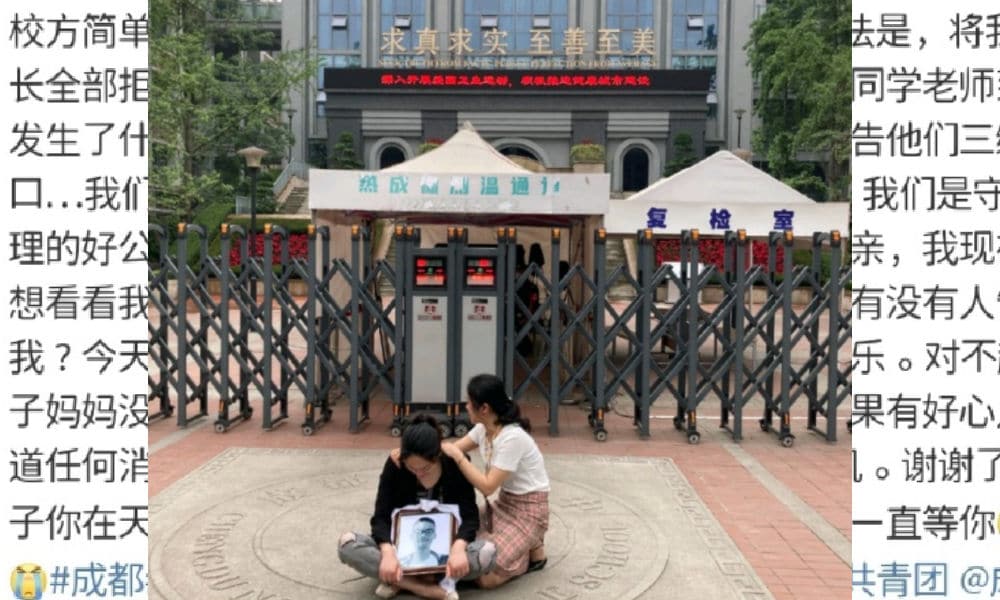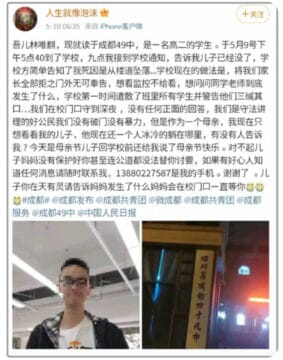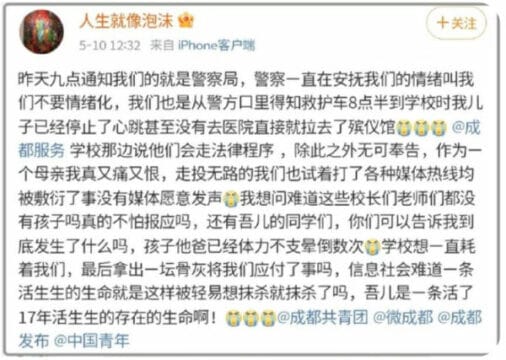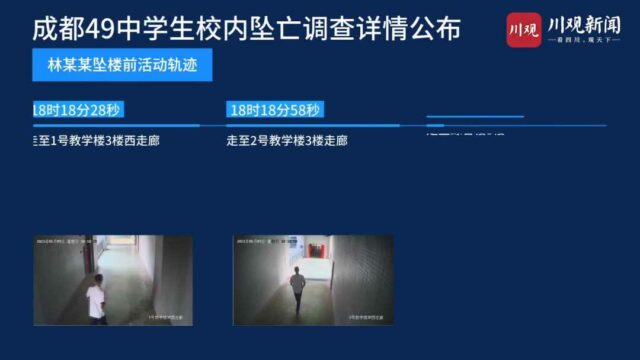China Insight
Chinese Netizens Are Seeking the Truth Behind the Mysterious Death of a Chengdu High School Student
The “Chengdu 49 Middle School Incident” has been dominating discussions on Chinese social media.
Published
4 years agoon

WHAT’S ON WEIBO ARCHIVE | PREMIUM CONTENT ARTICLE
First published
The death of Lin, a student from Chengdu, has become a national issue this week, leading to a wave of online rumors and theories on what might have happened to him. Some even claim the protests that erupted in response to the student’s death were set up by “foreign forces.”
The mysterious death of a high school student in Chengdu has been trending on Chinese social media and in mainstream media over the past few days, with bloggers and netizens looking for the truth behind the incident.
The 16-year-old Lin Weiqi (林唯麒), a student of Chengdu No. 49 Middle School, fell to his death around 18:40 on Sunday, May 9.
Lin’s parents allegedly were not notified about their son’s death until over two hours later, at 21:00, and were not allowed to enter the school, see their son, nor talk to teachers. And where was the surveillance video showing how this incident took place?
The case started getting major attention on social media after Lin’s mother (later switching to username @四十九中林同学妈妈) posted about her son’s death and the dubious circumstances surrounding it on Weibo on Monday morning. In the post, the mother suggested it took over an hour for an ambulance to reach her son’s school.


The case set off a stream of wild rumors. There was online speculation about corporal punishment and abuse taking place in the school, with one theory suggesting Lin had been pushed to his death by a chemistry teacher. Netizens speculated that the school was trying to cover up the incident.
The school responded to the issue on May 10, confirming that a student from their school fell “from height” in their school’s ‘Zhixing’ building. According to the school, they immediately called the police after the incident, and have now set up a special team to assist in any ongoing investigations.
The official Weibo account of Chenghua district of the city of Chengdu (@平安成华官方微博) issued a statement on the evening of May 11, ruling out any criminal elements to the death of Lin.
As reported by South China Morning Post, a joint statement by the district propaganda department, the police and the education bureau then stated that investigators had come to the initial conclusion that “the student took his own life due to personal problems.”
On the night of May 11, students gathered at the school and protested for the truth to come out. Videos shared on social media show dozens of students carrying flowers and chanting “Truth! Truth!”
Other videos show chaotic scenes of the rare demonstration, where protesters and police guards clashed.
成都49中的學生們,聚集在學校,高喊著"真相真相"! pic.twitter.com/97k1DZuixy
— 新聞看點 (@MuYangLee_XWKD) May 12, 2021
On May 12, the popular Wechat blogging account ‘Yi Jie’ (熠杰) published a lengthy post about the incident and its aftermath. The article claims that Lin committed suicide by jumping after an argument with his girlfriend. The reason Lin’s parents were not allowed to enter the school after their son’s death, Yi Jie writes, is because the forensic investigation was still ongoing.
Any rumors of teachers pushing students down the stairs or abusing students are false, the article says. Although the school could surely improve its crisis communication, the fact that it did not handle the communication about the incident in a professional way does not mean there is a ‘cover up’ going on.
The article, that was soon spread around on Weibo, also questioned the authenticity of the mother’s account, writing that three different cell phones were used to log in to Weibo and publish various posts, suggesting that the mother either has three different mobile phones or that there are different people in charge of her account.
Although he does not believe there is anything concealed behind the death of Lin, the blogger Yi Jie does have a theory about the ensuing protests, claiming those who demonstrated belonged to an “organized group” linked to “hostile forces.” Yi Jie even connects the protests to the CIA, claiming the protesters were paid to be there.
By Wednesday, many netizens were unsure of what to believe anymore. The hashtag “Chengdu 48 Middle [School]” (#成都49中#) had 1.6 billion views on Weibo at the time of writing.
“No wonder many people do not believe [what happened], I don’t believe it either. It’s always that the news is blocked once it comes out, it’s always that the surveillance camera records were lost, it’s been like that for many years. It’s not a method to protect social stability anymore,” one Weibo user writes.
Others blame Lin’s mother for causing all rumors: “After reading so much, I get the feeling we were cheated by that parent. This is not the first time that a victim’s family has gone crazy with public opinion, and it’s not the first time that I’ve fallen for it.”
There are also many who sympathize with Lin’s parents: “The loss of a child, it’s something that needs so many years to recover from. There’s so much pain. I just hope they’ll find answers.”
Update May 13
On May 13, Chinese media published a reconstruction of the May 9 incident, which attracted much attention online, with one page about the news (#监控还原成都49中学生坠亡前轨迹#) getting 1,3 billion views.
People’s Daily‘s post including the video received over 100,000 comments and 2,7 million likes.
The reconstruction is based on surveillance camera videos and police investigation, starting at 18:16 on Sunday night when Lin leaves a classroom on the 4th floor of the school building, going down the stairs to the 3rd floor on 18:17.

Surveillance cameras captured Lin leaving the 4th floor via the stairs and recorded how he was heading down the western hallway on the 3rd floor, walking on through various parts of the school, reaching the basketball court at 18:23, and then walking on to the building’s water pump room, where he stayed for over ten minutes.
A security camera recorded how Lin stayed in the corner of the room, holding a knife in his right hand and cutting himself in his left wrist.
After Lin leaves the room, he keeps on walking through the school’s hallways, reaching the fifth floor by 18:39. The next ten minutes have not been captured by security cameras, since Lin was located in blind spot areas outside of the vision of the installed security cameras. One camera from another building does capture a person’s silhouette falling from the building at 18:49.
“There are blind spots in the surveillance footage. I don’t think it’s unreasonable for the parents to initially doubt [the incident]. I think it’s the duty of the public security authorities to explain the course of the events of the incident and the crucial time points to the public,” one popular comment on Weibo said.
Others think the record has been set straight by this reconstruction, and are hoping Lin can now rest in peace.
The idea that the death of Lin was used by ‘evil forces’ for their own agenda, which was previously also raised by the Yi Jie blogger, is still circulating on Chinese social media – a theory that is supported by many.
The term “color revolution” is recurring in these discussions, with some netizens suggesting that foreign forces, such as the CIA, are trying to get local people to cause unrest through riots or demonstrations to undermine the stability of the government. There are people who believe those demonstrating in front of the Chengdu school were paid to do so.
“Certain hostile countries are watching all the time. Be alert,” one person wrote on Weibo.
By Manya Koetse, with contributions by Miranda Barnes
For information and support on mental health and suicide, international helplines can be found at www.befrienders.org.
Spotted a mistake or want to add something? Please let us know in comments below or email us. First-time commenters, please be patient – we will have to manually approve your comment before it appears.
©2021 Whatsonweibo. All rights reserved. Do not reproduce our content without permission – you can contact us at info@whatsonweibo.com.
Manya is the founder and editor-in-chief of What's on Weibo, offering independent analysis of social trends, online media, and digital culture in China for over a decade. Subscribe to gain access to content, including the Weibo Watch newsletter, which provides deeper insights into the China trends that matter. More about Manya at manyakoetse.com or follow on X.

China Insight
The Tragic Story of “Fat Cat”: How a Chinese Gamer’s Suicide Went Viral
The story of ‘Fat Cat’ has become a hot topic in China, sparking widespread sympathy and discussions online.
Published
6 months agoon
May 9, 2024
The tragic story behind the recent suicide of a 21-year-old Chinese gamer nicknamed ‘Fat Cat’ has become a major topic of discussion on Chinese social media, touching upon broader societal issues from unfair gender dynamics to businesses taking advantage of grieving internet users.
The story of a 21-year-old Chinese gamer from Hunan who committed suicide has gone completely viral on Weibo and beyond this week, generating many discussions.
In late April of this year, the young man nicknamed ‘Fat Cat’ (胖猫 Pàng Māo, literally fat or chubby cat), tragically ended his life by jumping into the river near the Chongqing Yangtze River Bridge (重庆长江大桥) following a breakup with his girlfriend. By now, the incident has come to be known as the “Fat Cat Jumping Into the River Incident” (胖猫跳江事件).
News of his suicide soon made its rounds on the internet, and some bloggers started looking into what was behind the story. The man’s sister also spoke out through online channels, and numerous chat records between the young man and his girlfriend emerged online.
One aspect of his story that gained traction in early May is the revelation that the man had invested all his resources into the relationship. Allegedly, he made significant financial sacrifices, giving his girlfriend over 510,000 RMB (approximately 71,000 USD) throughout their relationship, in a time frame of two years.
When his girlfriend ended the relationship, despite all of his efforts, he was devastated and took his own life.
The story was picked up by various Chinese media outlets, and prominent social and political commentator Hu Xijin also wrote a post about Fat Cat, stating the sad story had made him tear up.
As the news spread, it sparked a multitude of hashtags on Weibo, with thousands of netizens pouring out their thoughts and emotions in response to the story.
Playing Games for Love
The main part of this story that is triggering online discussions is how ‘Fat Cat,’ a young man who possessed virtually nothing, managed to provide his girlfriend, who was six years older, with such a significant amount of money – and why he was willing to sacrifice so much in order to do so.
The young man reportedly was able to make money by playing video games, specifically by being a so-called ‘booster’ by playing with others and helping them get to a higher level in multiplayer online battle games.
According to his sister, he started working as a ‘professional’ video gamer as a means of generating money to satisfy his girlfriend, who allegedly always demanded more.
He registered a total of 36 accounts to receive orders to play online games, making 20 yuan per game (about $2.80). Because this consumed all of his time, he barely went out anymore and his social life was dead.
In order to save more money, he tried to keep his own expenses as low as possible, and would only get takeout food for himself for no more than 10 yuan ($1,4). His online avatar was an image of a cat saying “I don’t want to eat vegetables, I want to eat McDonald’s.”

The woman in question who he made so many sacrifices for is named Tan Zhu (谭竹), and she soon became the topic of public scrutiny. In one screenshot of a chat conversation between Tan and her boyfriend that leaked online, she claimed she needed money for various things. The two had agreed to get married later in this year.
Despite of this, she still broke up with him, driving him to jump off the bridge after transferring his remaining 66,000 RMB (9135 USD) to Tan Zhu.
As the story fermented online, Tan Zhu also shared her side of the story. She claimed that she had met ‘Fat Cat’ over two years ago through online gaming and had started a long distance relationship with him. They had actually only met up twice before he moved to Chongqing. She emphasized that financial gain was never a motivating factor in their relationship.
Tan additionally asserted that she had previously repaid 130,000 RMB (18,000 USD) to him and that they had reached a settlement agreement shortly before his tragic death.
Ordering Take-Out to Mourn Fat Cat
– “I hope you rest in peace.”
– “Little fat cat, I hope you’ll be less foolish in your next life.”
– “In your next life, love yourself first.”
These are just a few of the messages left by netizens on notes attached to takeout food deliveries near the Chongqing Yangtze River Bridge.

AI-generated image spread on Chinese social media in connection to the event.
As Fat Cat’s story stirred up significant online discussion, with many expressing sympathy for the young man who rarely indulged in spending on food and drinks, some internet users took the step of ordering McDonalds and other food delivery services to the bridge, where he tragically jumped from, in his honor.
This soon snowballed into more people ordering food and drinks to the bridge, resulting in a constant flow of delivery staff and a pile-up of take-out bags.

Delivery food on the bridge, photo via Weibo.
However, as the food delivery efforts picked up pace, it came to light that some of the deliveries ordered and paid for were either empty or contained something different; certain restaurants, aware of the collective effort to honor the young man, deliberately left the food boxes empty or substituted sodas or tea with tap water.

At least five restaurants were caught not delivering the actual orders. Chinese bubble tea shop ChaPanda was exposed for substituting water for milk tea in their cups. On May 3rd, ChaPanda responded that they had fired the responsible employee.
Another store, the Zhu Xiaoxiao Luosifen (朱小小螺蛳粉), responded on that they had temporarily closed the shop in question to deal with the issue. Chinese fast food chain NewYobo (牛约堡) also acknowledged that at least twenty orders they received were incomplete.
Fast food company Wallace (华莱士) responded to the controversy by stating they had dismissed the employees involved. Mixue Ice Cream & Tea (蜜雪冰城) issued an apology and temporarily closed one of their stores implicated in delivering empty orders.
In the midst of all the controversy, Fat Cat’s sister asked internet users to refrain from ordering take-out food as a means of mourning and honoring her brother.
Nevertheless, take-out food and flowers continued to accumulate near the bridge, prompting local authorities to think of ways of how to deal with this unique method of honoring the deceased gamer.
Gamer Boy Meets Girl
On Chinese social media, this story has also become a topic of debate in the context of gender dynamics and social inequality.
There are some male bloggers who are angry with Tan Zhu, suggesting her behaviour is an example of everything that’s supposedly “wrong” with Chinese women in this day and age.
Others place blame on Fat Cat for believing that he could buy love and maintain a relationship through financial means. This irked some feminist bloggers, who see it as a chauvinistic attitude towards women.
A main, recurring idea in these discussions is that young Chinese men such as Fat Cat, who are at the low end of the social ladder, are actually particularly vulnerable in a fiercely competitive society. Here, a gender imbalance and surplus of unmarried men make it easier for women to potentially exploit those desperate for companionship.
The story of Fat Cat brings back memories of ‘Mo Cha Official,’ a not-so-famous blogger who gained posthumous fame in 2021 when details of his unhappy life surfaced online.
Likewise, the tragic tale of WePhone founder Su Xiangmao (苏享茂) resurfaces. In 2017, the 37-year-old IT entrepreneur from Beijing took his own life, leaving behind a note alleging blackmail by his 29-year-old ex-wife, who demanded 10 million RMB (±1.5 million USD) (read story).
Another aspect of this viral story that is mentioned by netizens is how it gained so much attention during the Chinese May holidays, coinciding with the tragic news of the southern China highway collapse in Guangdong. That major incident resulted in the deaths of at least 48 people, and triggered questions over road safety and flawed construction designs. Some speculate that the prominence given to the Fat Cat story on trending topic lists may have been a deliberate attempt to divert attention away from this incident.
‘Fat Cat’ was cremated. His family stated their intention to take necessary legal steps to recover the money from his former girlfriend, but Tan Zhu reportedly already reached an agreement with the father and settled the case. Nevertheless, the case continues to generate discussions online, with some people wondering: “Is it over yet? Can we talk about something different now?”

Fat Cat images projected in Times Square
However, given that images of the ‘Fat Cat’ avatar have even appeared in Times Square in New York by now (Chinese internet users projected it on one of the big LED screens), it’s likely that this story will be remembered and talked about for some time to come.
UPDATE MAY 25
On May 20, local authorities issued a lengthy report to clarify the timeline of events and details surrounding the death of “Fat Cat,” which had attracted significant attention across China.
The report concluded that there was no fraud involved and that “Fat Cat” and his girlfriend were in a genuine relationship. Tan did not deceive “Fat Cat” for money; the transfers were voluntary. Furthermore, Tan returned most of the money to his parents.
The gamer’s sister is reportedly still being investigated for potentially infringing on Tan’s privacy by disclosing numerous private details to the public.
In the end, one thing is clear in this gamer’s tragic story, which is that there are no winners.
By Manya Koetse
– With contributions by Miranda Barnes and Ruixin Zhang
Independently reporting China trends for over a decade. Like what we do? Support us and get the story behind the hashtag by subscribing:
Spotted a mistake or want to add something? Please let us know in comments below or email us. First-time commenters, please be patient – we will have to manually approve your comment before it appears.
©2024 Whatsonweibo. All rights reserved. Do not reproduce our content without permission – you can contact us at info@whatsonweibo.com.
China Brands, Marketing & Consumers
A Brew of Controversy: Lu Xun and LELECHA’s ‘Smoky’ Oolong Tea
Chinese tea brand LELECHA faced backlash for using the iconic literary figure Lu Xun to promote their “Smoky Oolong” milk tea, sparking controversy over the exploitation of his legacy.
Published
6 months agoon
May 3, 2024
It seemed like such a good idea. For this year’s World Book Day, Chinese tea brand LELECHA (乐乐茶) put a spotlight on Lu Xun (鲁迅, 1881-1936), one of the most celebrated Chinese authors the 20th century and turned him into the the ‘brand ambassador’ of their special new “Smoky Oolong” (烟腔乌龙) milk tea.
LELECHA is a Chinese chain specializing in new-style tea beverages, including bubble tea and fruit tea. It debuted in Shanghai in 2016, and since then, it has expanded rapidly, opening dozens of new stores not only in Shanghai but also in other major cities across China.
Starting on April 23, not only did the LELECHA ‘Smoky Oolong” paper cups feature Lu Xun’s portrait, but also other promotional materials by LELECHA, such as menus and paper bags, accompanied by the slogan: “Old Smoky Oolong, New Youth” (“老烟腔,新青年”). The marketing campaign was a joint collaboration between LELECHA and publishing house Yilin Press.

Lu Xun featured on LELECHA products, image via Netease.
The slogan “Old Smoky Oolong, New Youth” is a play on the Chinese magazine ‘New Youth’ or ‘La Jeunesse’ (新青年), the influential literary magazine in which Lu’s famous short story, “Diary of a Madman,” was published in 1918.
The design of the tea featuring Lu Xun’s image, its colors, and painting style also pay homage to the era in which Lu Xun rose to prominence.
Lu Xun (pen name of Zhou Shuren) was a leading figure within China’s May Fourth Movement. The May Fourth Movement (1915-24) is also referred to as the Chinese Enlightenment or the Chinese Renaissance. It was the cultural revolution brought about by the political demonstrations on the fourth of May 1919 when citizens and students in Beijing paraded the streets to protest decisions made at the post-World War I Versailles Conference and called for the destruction of traditional culture[1].
In this historical context, Lu Xun emerged as a significant cultural figure, renowned for his critical and enlightened perspectives on Chinese society.
To this day, Lu Xun remains a highly respected figure. In the post-Mao era, some critics felt that Lu Xun was actually revered a bit too much, and called for efforts to ‘demystify’ him. In 1979, for example, writer Mao Dun called for a halt to the movement to turn Lu Xun into “a god-like figure”[2].
Perhaps LELECHA’s marketing team figured they could not go wrong by creating a milk tea product around China’s beloved Lu Xun. But for various reasons, the marketing campaign backfired, landing LELECHA in hot water. The topic went trending on Chinese social media, where many criticized the tea company.
Commodification of ‘Marxist’ Lu Xun
The first issue with LELECHA’s Lu Xun campaign is a legal one. It seems the tea chain used Lu Xun’s portrait without permission. Zhou Lingfei, Lu Xun’s great-grandson and president of the Lu Xun Cultural Foundation, quickly demanded an end to the unauthorized use of Lu Xun’s image on tea cups and other merchandise. He even hired a law firm to take legal action against the campaign.
Others noted that the image of Lu Xun that was used by LELECHA resembled a famous painting of Lu Xun by Yang Zhiguang (杨之光), potentially also infringing on Yang’s copyright.
But there are more reasons why people online are upset about the Lu Xun x LELECHA marketing campaign. One is how the use of the word “smoky” is seen as disrespectful towards Lu Xun. Lu Xun was known for his heavy smoking, which ultimately contributed to his early death.
It’s also ironic that Lu Xun, widely seen as a Marxist, is being used as a ‘brand ambassador’ for a commercial tea brand. This exploits Lu Xun’s image for profit, turning his legacy into a commodity with the ‘smoky oolong’ tea and related merchandise.
“Such blatant commercialization of Lu Xun, is there no bottom limit anymore?”, one Weibo user wrote. Another person commented: “If Lu Xun were still alive and knew he had become a tool for capitalists to make money, he’d probably scold you in an article. ”
On April 29, LELECHA finally issued an apology to Lu Xun’s relatives and the Lu Xun Cultural Foundation for neglecting the legal aspects of their marketing campaign. They claimed it was meant to promote reading among China’s youth. All Lu Xun materials have now been removed from LELECHA’s stores.

Statement by LELECHA.
On Chinese social media, where the hot tea became a hot potato, opinions on the issue are divided. While many netizens think it is unacceptable to infringe on Lu Xun’s portrait rights like that, there are others who appreciate the merchandise.
The LELECHA controversy is similar to another issue that went trending in late 2023, when the well-known Chinese tea chain HeyTea (喜茶) collaborated with the Jingdezhen Ceramics Museum to release a special ‘Buddha’s Happiness’ (佛喜) latte tea series adorned with Buddha images on the cups, along with other merchandise such as stickers and magnets. The series featured three customized “Buddha’s Happiness” cups modeled on the “Speechless Bodhisattva” (无语菩萨), which soon became popular among netizens.

The HeyTea Buddha latte series, including merchandise, was pulled from shelves just three days after its launch.
However, the ‘Buddha’s Happiness’ success came to an abrupt halt when the Ethnic and Religious Affairs Bureau of Shenzhen intervened, citing regulations that prohibit commercial promotion of religion. HeyTea wasted no time challenging the objections made by the Bureau and promptly removed the tea series and all related merchandise from its stores, just three days after its initial launch.
Following the Happy Buddha and Lu Xun milk tea controversies, Chinese tea brands are bound to be more careful in the future when it comes to their collaborative marketing campaigns and whether or not they’re crossing any boundaries.
Some people couldn’t care less if they don’t launch another campaign at all. One Weibo user wrote: “Every day there’s a new collaboration here, another one there, but I’d just prefer a simple cup of tea.”
By Manya Koetse
[1]Schoppa, Keith. 2000. The Columbia Guide to Modern Chinese History. New York: Columbia UP, 159.
[2]Zhong, Xueping. 2010. “Who Is Afraid Of Lu Xun? The Politics Of ‘Debates About Lu Xun’ (鲁迅论争lu Xun Lun Zheng) And The Question Of His Legacy In Post-Revolution China.” In Culture and Social Transformations in Reform Era China, 257–284, 262.
Independently reporting China trends for over a decade. Like what we do? Support us and get the story behind the hashtag by subscribing:
Spotted a mistake or want to add something? Please let us know in comments below or email us. First-time commenters, please be patient – we will have to manually approve your comment before it appears.
©2024 Whatsonweibo. All rights reserved. Do not reproduce our content without permission – you can contact us at info@whatsonweibo.com.
Subscribe

The ‘Cycling to Kaifeng’ Trend: How It Started, How It’s Going

Hu Xijin’s Comeback to Weibo

Weibo Watch: “Comrade Trump Returns to the Palace”

The Price of Writing Smut: Inside China’s Crackdown on Erotic Fiction

Controversial Wanghong Livestreamers Are Becoming a Weibo Staple in China

“Land Rover Woman” Sparks Outrage: Qingdao Road Rage Incident Goes Viral in China

China at Paris 2024 Olympics Trend File: Medals and Moments on Chinese Social Media

Weibo Watch: The Land Rover Woman Controversy Explained

Stolen Bodies, Censored Headlines: Shanxi Aorui’s Human Bone Scandal

Fired After Pregnancy Announcement: Court Case Involving Pregnant Employee Sparks Online Debate

Team China’s 10 Most Meme-Worthy Moments at the 2024 Paris Olympics

Weibo Watch: Going the Wrong Way

Weibo Watch: Shaping Olympic Narratives

The Rising Influence of Fandom Culture in Chinese Table Tennis

China at the 2024 Paralympics: Golds, Champions, and Trending Moments
Get in touch
Would you like to become a contributor, or do you have any tips or suggestions? Get in touch here!
Popular Reads
-

 China Insight6 months ago
China Insight6 months agoThe Tragic Story of “Fat Cat”: How a Chinese Gamer’s Suicide Went Viral
-

 China Music8 months ago
China Music8 months agoThe Chinese Viral TikTok Song Explained (No, It’s Not About Samsung)
-

 China Insight8 months ago
China Insight8 months agoThe ‘Two Sessions’ Suggestions: Six Proposals Raising Online Discussions
-

 China Insight12 months ago
China Insight12 months agoThe Story of Li Jun & Liang Liang: How the Challenges of an Ordinary Chinese Couple Captivated China’s Internet




